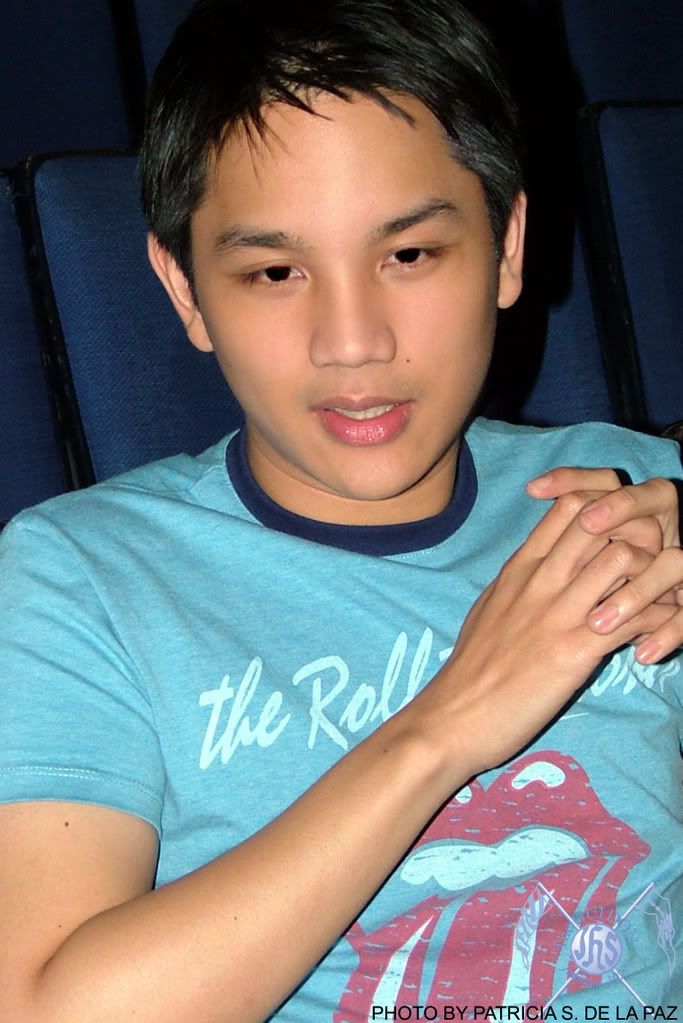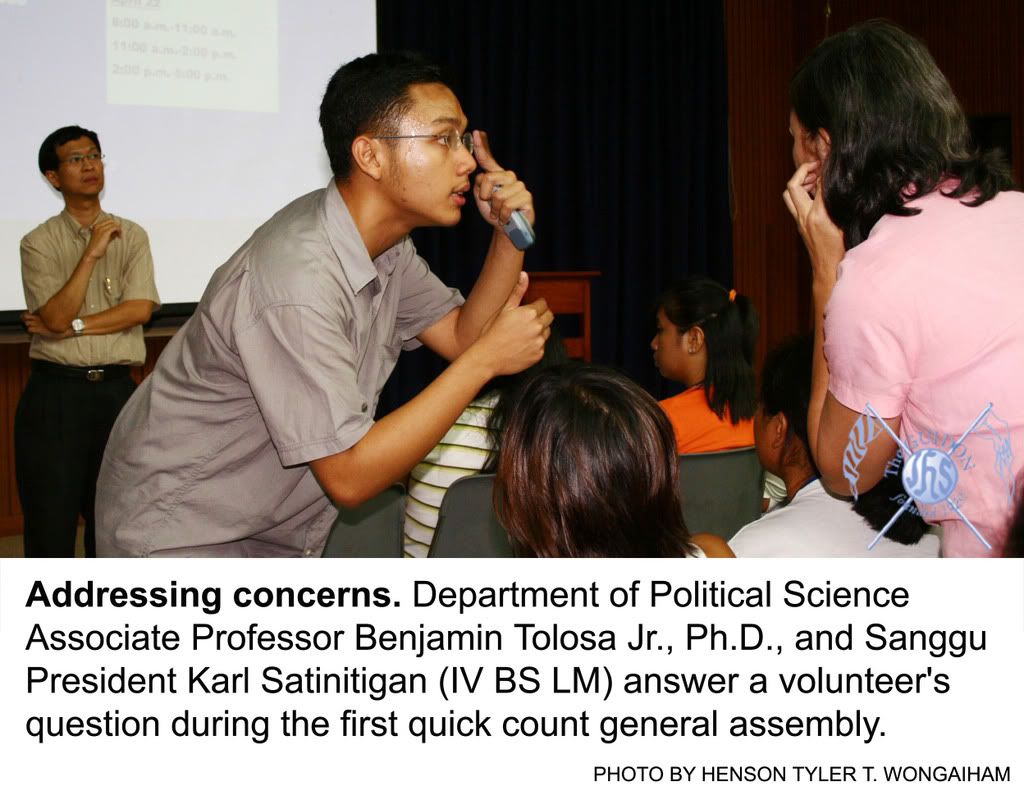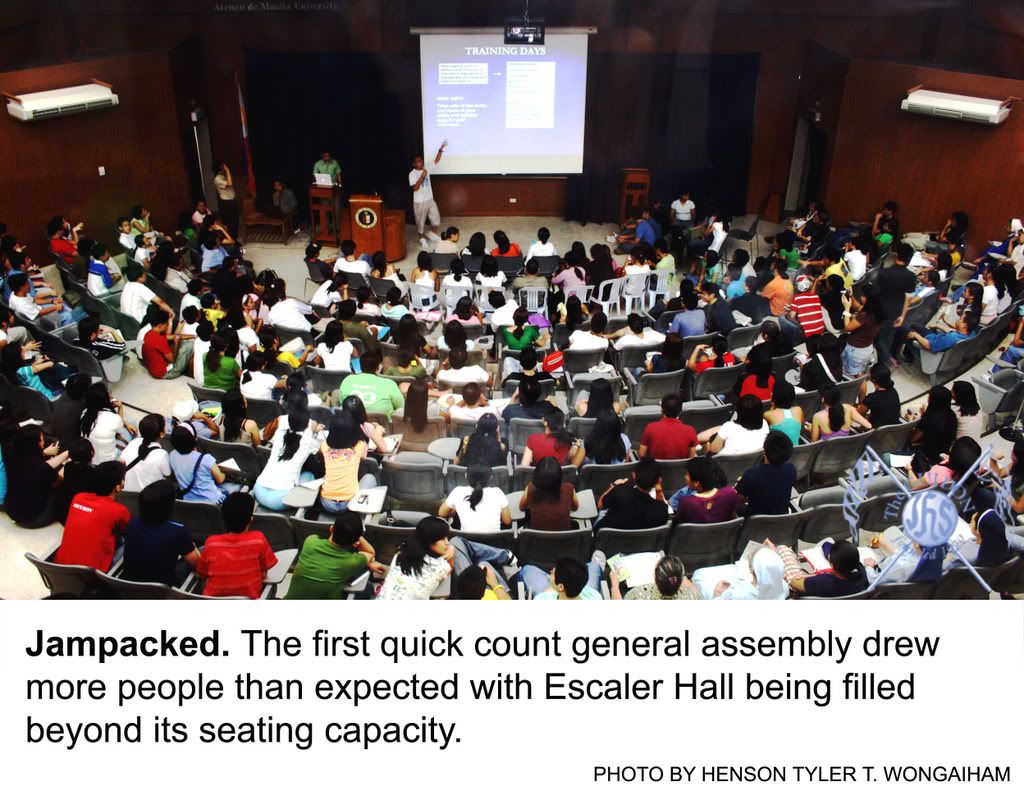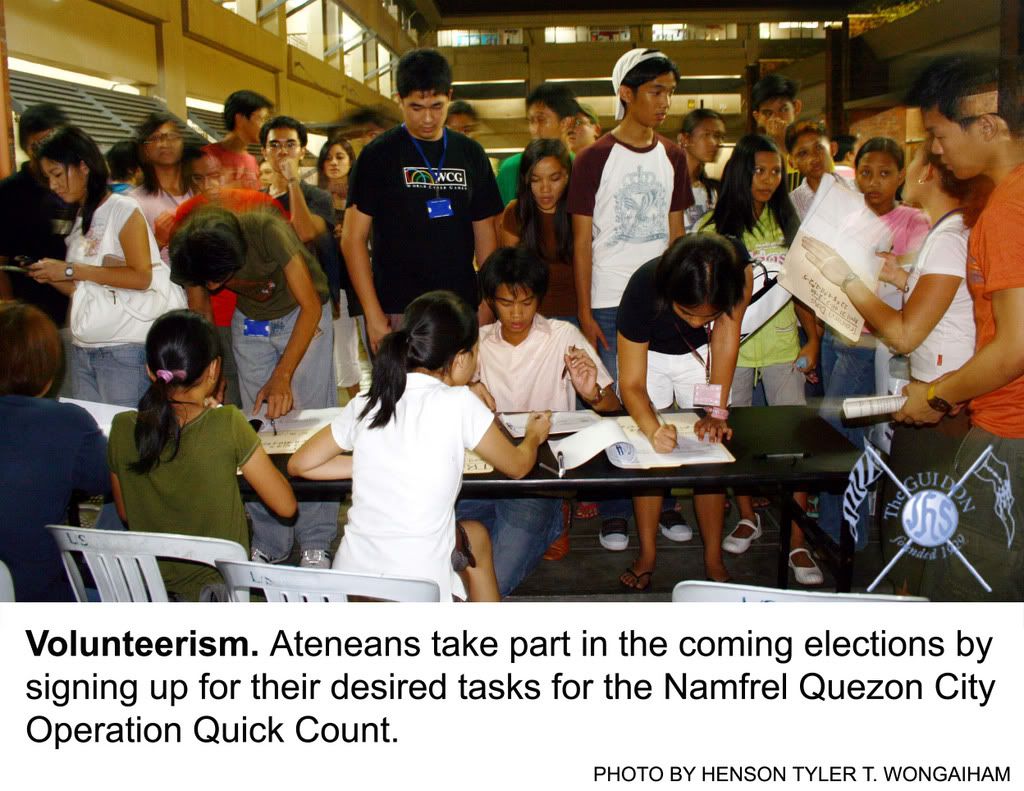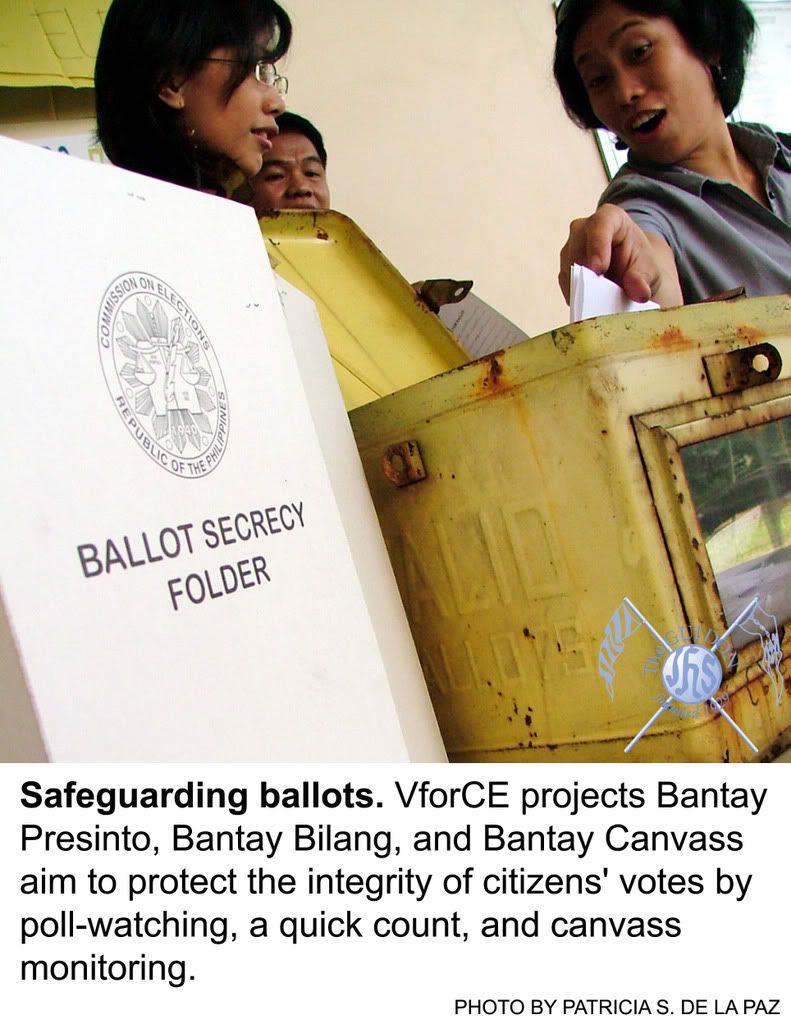by Kristina Amanda A. Cruz and Erik S. Fajardo
VforCE, a nationwide movement to safeguard the integrity of the elections, is a menu catering to all volunteers’ tastes. Political education, election monitoring, public information and communications, resource generation and more sub-cluster programs—just take your pick and make a difference.
POLITICAL EDUCATION
Pinoy Voters' Academy
The Pinoy Voters’ Academy (PVA) of the Pastoral Parish Council for Responsible Voting (PPCRV) was developed in partnership with the Simbahang Lingkod ng Bayan (SLB) of the Jesuit Philippine Province to be the anchor of political education work. The PVA is a participative process of political education leading to action-planning by local communities.
To volunteer, contact:
- SLB (09263041826; slb@admu.edu.ph)
- Bro. Javy Alpasa, SJ (09205556617; javieralpasa@gmail.com )
- Jess Paul Pasible (09273382282; jesspaul_pasibe@yahoo.com)
Bantay Pangako
Bantay Pangako builds on the covenants signed by the candidates and communities to create mechanisms for monitoring campaign promises and demanding accountability after the elections.
This project is inspired by the Silingan Ka experience in Ipil Prelature, Zamboanga-Sibugay. Organizations like the PPCRV, NASSA, SLB, the Ateneo School of Government (ASG), and the Office for Social Concern and Involvement (OSCI) are working on this front. It also aims to draw in various socially oriented organizations involved in direct community development work.
To volunteer, contact:
- Randy Tuano (09192837282; ptuano@ateneo.edu)
- Benj Barretto (09282628384; gesuiella@yahoo.com )
Bantay Pulitiko and Bantay Agenda Candidates' Forums and Profiles
A central component of political education is the holding of candidates' forums. The Union of Catholic Student Councils (UCSC) sponsored a senatorial candidates' forum at St. Scholastica's College (SSC) last March 9.
Various schools, communities, and civic organizations have also been holding candidates’ forums and debates. The Commission on Elections (Comelec), PPCRV, and ABS-CBN have an ongoing senatorial candidates’ forum televised live over ANC on Mondays, Wednesdays and Fridays at 6PM, and replayed at various times and channels, as an integral part of voters' education.
To volunteer, contact:
Bantay Pulitiko Web Profiles (SLB / De La Salle University / ivote.ph)
- Bro. Javy Alpasa, SJ (09205556617; javieralpasa@gmail.com )
- Wadel Cabrera (DLSU COSCA: 09214850920; cabrera@dlsu.edu.ph)
- Gino Nacianceno (iVote.ph: 09176270870; gnacianceno@ivote.ph)
Bantay Agenda Candidates’ Debates (UCSC)
- Luis Abad (09178318861; luish0328@yahoo.com)
Voter and Volunteer Information Call Center
As the main secretariat for VforCE, the SLB, in cooperation with the ASG and Puwersa para sa Ganap na Demokrasya – Laban na Wagas para sa Isang Nasyon (PUGAD-LAWIN), operates a call center that helps in the recruitment, deployment and coordination of volunteers, and answers election-related inquiries from voters around the country and overseas.
To volunteer or call:
- vforce2007@gmail.com (email)
- 09263041826 (mobile)
- 4265968 (fax)
- 4266101 ext. 3440/3441 (landline)
ELECTION MONITORING
Bantay Kampanya: Campaign Finance Monitoring
Transparency and Accountability Network’s (TAN) Pera’t Pulitika, Ehem!, Libertas, the Consortium on Electoral Reforms (CER), the Philippine Political Science Association-Democracy Audit (PPSA-DA) and Access to Information Network (ATIN) all investigate fund-raisings for campaigns, ensuring expenditures do not go beyond the implemented budget per voter.
To volunteer, contact:
- Campaign Finance Monitoring (Pera’t Pulitika): Vince Lazatin (09228651228; vtlazatin@yahoo.com)
- Walang Hihingi (Ehem!) Fr. Albert Alejo, SJ (09177045474; paringbert@yahoo.com)
Bantay Presinto: Pollwatch 2007
The PPCRV is now on its 15th year of campaigning for clean elections and training poll-watchers to monitor election activities in almost 300,000 precincts.
Bantay Bilang: Operation Quick Count
It may be called “quick,” but accuracy is still priority over speed in the quick count simultaneous with the Comelec’s official tally. Volunteers of the PPRCV and National Secretariat for Social Action (NASSA) also participate in the quick count, aside from accredited citizens’ vote counters National Movement for Free Elections (Namfrel).
Bantay Canvass: Monitoring of vote aggregation
The Legal Network for Truthful Elections (LENTE) is composed of the Integrated Bar of the Philippines (IBP), the Catholic Bishops’ Conference of the Philippines (CBCP) National Secretariat, other law schools, and One Voice—all volunteering not only as trained and knowledgeable monitors of vote totals, but as legal assistants when needed. IBP is harnessing its close to 50,000 members to volunteer in addition to LENTE’s lawyers, paralegals and law students fielded out in over 1,600 canvassing points in municipal and provincial levels.
To volunteer, contact:
- Atty. Carlos Medina (09178957001; cmedina@aps.ateneo.edu, cp_medina@yahoo.com)
- Ona Caritos (09064924438; rcaritos@yahoo.com )
Bantay Text and Bantay Blogger
Seminarians Network (SemNet) and the SLB take on the youth’s mode of communication: SMS and Web logs or blogs to attract (perhaps younger) citizens to participate in monitoring and documenting the election process.
Bantay Eleksyon: Comelec Watch
The Consortium on Electoral Reforms (CER) is focused on documentation of all election activities, especially those of the Comelec.
To volunteer, contact:
- bantayeleksyon07@gmail.com
- 09214831153
PUBLIC INFORMATION and COMMUNICATION
The media campaign for VforCE is being conceptualized by Campaigns and Grey. For LENTE, Joan Orendain and Associates are handling communications. The communications work for Pinoy Bantay Bayan, the Ateneo-Jesuit contribution to VforCE, is led by the Ateneo Debate Society (ADS), the Harvard Project for Asian and International Relations (HPAIR), and the Association of Communication Majors (Acomm).
RESOURCE GENERATION
The Makati Business Club (MBC) is set on financially mobilizing VforCE by putting up the Democracy Fund. The political education groups, election monitoring groups and other supported clusters of VforCE may all withdraw from the fund once all plans and efforts are formalized.
More contact information:
PPCRV Email: parishpcrv@yahoo.com
Landline: (632) 5242855
Fax: (632) 5280149
NAMFREL Email: namfrel@yahoo.com
Text: 09177339619
Landline: (632) 6362921
Fax: (632) 6345136
NASSA Email: admin@nassa.org.ph
Landline: (632) 5274147
Fax: (632) 5274144
LENTE: Email: aacunesco@yahoo.com
Landline: (632) 8997691 ext. 2123
Fax: (632) 8994342
